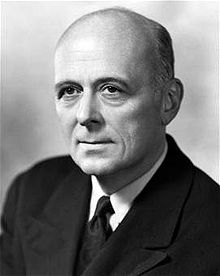Thomas K. Finletter
Thomas Knight Finletter (* 11. November 1893 in Philadelphia , Pennsylvania ; † 24. April 1980 ) was an American lawyer and the second Air Force Secretary ( Secretary of the Air Force ) of the United States.
biography
Degree and lawyer
After attending school, he studied at the University of Pennsylvania and graduated in 1915 with a Bachelor of Arts (BA). He then began to study law at Philadelphia University, but interrupted it after the USA entered the First World War in April 1917 and began his military service . During the war he was promoted to captain of the 312th Field Artillery .
After the war he continued his studies ended this in 1920 with a Bachelor of Laws (LL.B.) and was subsequently first in Pennsylvania and in 1921 in New York as a lawyer admitted. He quickly gained a reputation as a specialist in bankruptcy law and was a partner in the law firm Coudert Brothers in New York between 1926 and 1941 . In addition, he acted from 1931 to 1941 as a lecturer at the Law School of the University of Pennsylvania.
In 1941 he moved to the civil service for the first time and became special assistant to US Secretary of State Cordell Hull for international economic affairs . He was then in 1943, first Executive Director and Deputy Director of the Office of the Coordinator for Foreign Trade ( Office of Foreign Economic Coordinator (OFEC) ). In this function he was responsible for the economic planning activities in the liberated areas and at the same time was responsible for overseeing foreign trade and handling the hostile property supervision ( Alien Property Custodian ). However, he resigned from this office in 1944 after the tasks of OFEC had been taken over by the Foreign Economic Administration .
In 1945 he was an advisor to the United Nations Convention in San Francisco . On July 18, 1947, he returned to government service and was appointed by US President Harry S. Truman as chairman of the five-member commission he had set up, which dealt with all aviation issues and presented the report on national aviation policy. This report, officially titled Survival in the Air Age , unofficially called the Finletter Report, warned that a weak US air force would be unable to defend the United States in the event of a nuclear attack . Therefore, the report urged that operational readiness should be rebuilt as soon as possible - with the help of a viable aviation industry .
In early 1949 he became head of the mission of the Economic Cooperation Administration in the United Kingdom , based in London .
Air Force Minister and NATO Ambassador
On April 24, 1950, he was appointed Second Secretary of the Air Force by President Truman to succeed Stuart Symington and held that post until the end of Truman's tenure on January 20, 1953.
During his tenure, the Air Force Organization Act 1951 began to transform the structure of the Air Force. While the law failed to resolve supply-related issues, it did clarify the roles and responsibilities of the Air Force Secretary and Chief of Staff of the Air Force , in which the Secretary of the Air Force is nominally the chief of the United States Air Force was.
Finletter has been a constant advocate building an air force strong enough to hold back a threat from the Soviet Union and adaptable enough to face sudden or limited combat. As a result of the Korean War , the modernization and growth of the Air Force was expanded, which resulted in the US Air Force being almost three times as large at the end of his tenure as at the time of his predecessor Stuart Symington. In doing so, he completed the reorganization prior to the expansion of the powers of the Ministry of Defense .
After leaving the government, he resumed his practice as a lawyer. In 1956 he was elected to the American Academy of Arts and Sciences . Finletter, who was a member of the Democrats , was a delegate to the Democratic National Convention for New York in 1960 , before he was appointed Ambassador of the United States to NATO in March 1961 and held this office during the presidencies of John F. Kennedy and Lyndon B. Johnson up September 1965 exercised.
Web links
- Biography on the US Air Force homepage
- The Political Graveyard
- Newspaper article about Thomas K. Finletter in the 20th century press kit of the ZBW - Leibniz Information Center for Economics .
| personal data | |
|---|---|
| SURNAME | Finletter, Thomas K. |
| ALTERNATIVE NAMES | Finletter, Thomas Knight (full name) |
| BRIEF DESCRIPTION | American politician |
| DATE OF BIRTH | November 11, 1893 |
| PLACE OF BIRTH | Philadelphia , Pennsylvania |
| DATE OF DEATH | April 24, 1980 |

